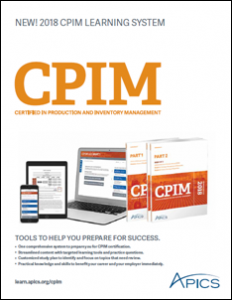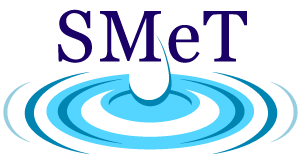CPIM – Course in Production and Inventory Management

The APICS Certified in Production and Inventory Management (CPIM) program provides you with the ability to understand and evaluate production and inventory ACTIVITIES within a company’s global operations.
The APICS CPIM program benefits designees worldwide
APICS CPIM is preferred by thousands of EMPLOYERS worldwide.
More than 100,000 professionals since 1973 have EARNED the APICS CPIM designation.
APICS CPIM helps you master essential terminology, concepts, and strategies related to:
- Demand management
- Procurement management
- Supplier planning
- Material requirements planning
- Capacity planning
- Sales and operations planning
- Master scheduling
- Performance measurements
- Supplier relationships
- Quality control
- Continuous improvement
What are the advantages of earning the APICS CPIM qualification?
- It can increase your earing potential by approximately 10%
- It can improve your chances of being employed in the growing supply chain industry
- Understand return on your investment in systems and how to improve it.
- Reduce company costs – often in activities which go straight to the bottom line
- Add more value to your company
- Allows you to improve customer satisfaction and the drivers which underpin this
CPIM
Candidates must pass 1 exam for each part in order to earn the CPIM designation: The parts are :
Part 1
Basics of Supply Chain Management (BSCM)
The module covers the basic concepts in managing the complete flow of materials in a supply chain. This goes from suppliers to customer. Supply chain concepts are introduced and basic terminology are emphasised. These include such as relationships among activities in the supply chain. Topics include: Introduction to Supply Chain Management, Demand Management and Forecasting Techniques, Priority and Capacity Planning at the Master Planning, MRP and PAC levels, Aggregate and Item Inventory Management, Purchasing and Physical Distribution and Lean/JIT, Quality Systems and Theory of Constraints.
Part 2
Module 1
Strategic Management of Resources (SMR)
Explore the relationship of existing and emerging processes and technologies to manufacturing strategy and supply chain-related functions. The course addresses three main topics: aligning resources with the strategic plan, configuring and integrating operating processes to support the strategic plan, and implementing change. Topics include: Competitive Market Issues, Choices Affecting Facilities, Supply Chain, Information Technology, and Organisational Design, Configuring and Integrating Internal Processes and Evaluating and Managing Projects.
Module 2
Master Planning of Resources (MRP)
Explore the processes used to develop sales and operations plans and identify and assess internal and external demand and forecasting requirements. The course focuses on the importance of producing achievable master schedules that are consistent with business policies, objectives, and resource constraints. Topics include: Demand Management, Sales and Operations Planning, Master Scheduling and Measuring Business Performance.
Module 3
Detailed Scheduling and Planning (DSP)
Focus on the various techniques for material and capacity scheduling. Study detailed descriptions of material requirement planning (MRP), capacity requirements planning (CRP), inventory management practices, and procurement and supplier planning. Topics include: Recognising Techniques and Practices of Inventory Management, Mechanics of the Detailed Material Planning Process, Planning Operations to Support the Priority Plan and Planning Procurement and External Sources of Supply.
Module 4
Execution and Control of Operations (ECO)
Focus on the areas of prioritising and sequencing work, executing work plans and implementing controls, reporting activity results, and providing feedback on performance. The course explains techniques for scheduling and controlling production processes, the execution of quality initiatives and continuous improvement plans, and the control and handling of inventories. Topics include: Prioritising and Sequencing Work, Executing Plans and Implementing Controls, Authorising and Reporting Activities for Push and Pull Systems and Evaluating Performance and Providing Feedback.

